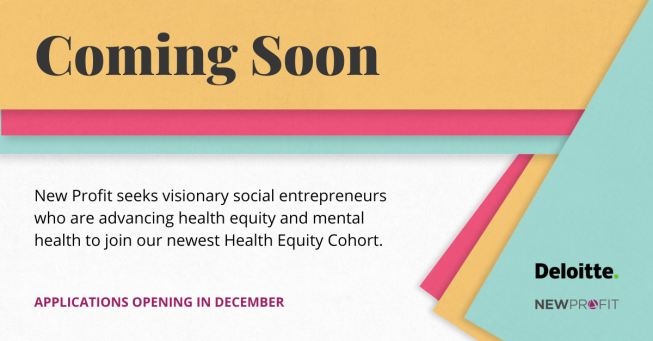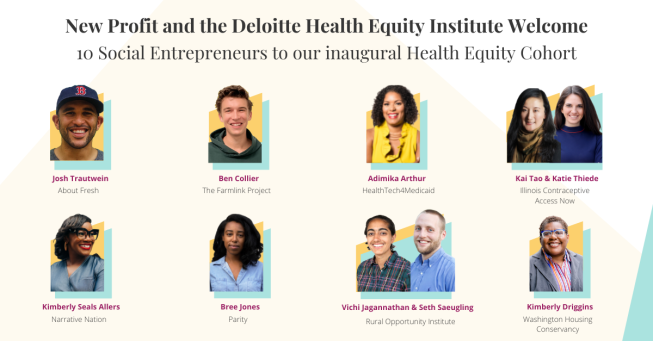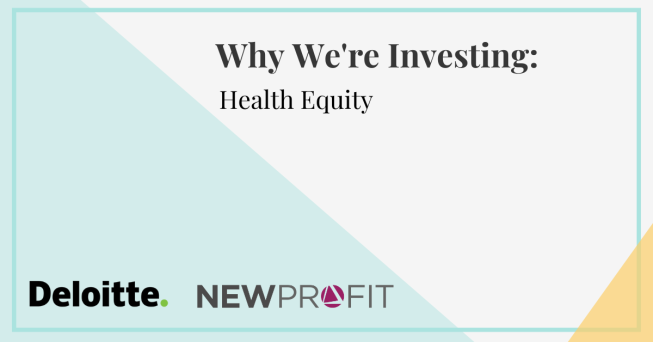Coming Soon: New Profit’s Second Health Equity Catalyze Cohort – Focused on Mental Health

We are excited to announce that we will be accepting applications for the second Health Equity Catalyze Cohort focused specifically on Mental Health Equity beginning in early December. This Health Equity Catalyze Cohort will provide $100K in catalytic, unrestricted funding and cohort-based capacity-building programming for up to 16 social entrepreneurs.
Our nation is experiencing a collective mental and behavioral health crisis. Over 50 million adults in the United States are living with a mental illness¹, 12 million adults report having serious thoughts of suicide², and in 2020, over 40 million people reported having a substance use disorder in the past year³. For young people, even before the COVID-19 pandemic, mental health challenges were the leading cause of disability and poor life outcomes, with up to 1 in 5 children ages 3 to 17 in the United States having a mental, emotional, developmental, or behavioral disorder. This has been exacerbated further by the pandemic, which disrupted in-person schooling; social opportunities with peers; access to healthcare, social services, food, and housing; and the health of caregivers⁴.
Furthermore, we know that a person’s zip code, race, income, and other social, environmental, and economic conditions play a significant part in determining their mental health. For example, while racially and ethnically diverse individuals have rates of mental health disorders similar to white people, their disorders are more likely to last longer and result in more significant disability. Most mental illness goes untreated, especially in racially and ethnically diverse communities; 48 percent of white people with any mental illness received mental health services in 2015, compared to 31 percent of Black people and Hispanics, and 22 percent of Asians⁵.
New Profit believes that good mental and behavioral health is necessary for all people to live lives of their choosing – and that we should address the mental health needs of systemically disadvantaged populations to achieve health equity overall. To that end, in collaboration with the Deloitte Health Equity Institute, we are launching our second health equity cohort, focused specifically on mental health equity.
This cohort will support a range of cross-cutting systems-change approaches (e.g., narrative change, ecosystem development, advocacy, movement building) at the intersection of mental health & well-being and the social determinants or drivers of health. We are especially seeking to invest in organizations that are focused on creating change with/through behavioral and mental health care and services, as well as programs that intentionally focus their efforts on non-medical drivers of behavioral and mental health (e.g., access to healthy food, jobs, housing, social connection, etc.).
As we build the cohort, we are searching for organizations that are addressing systemic mental and behavioral health issues at each life stage and transition point where these issues may be most acute (e.g., youth transitioning between educational settings, young adults transitioning into the workforce, individuals undergoing re-entry after incarceration or rehabilitation from substance abuse, etc.). We also aim to support some organizations that are already connected to or interested in working in school settings, given how many young people are experiencing mental health challenges in the wake of the pandemic.
We will invest $100,000 in up to 16 innovative systems-change leaders and nonprofit organizations through this cohort. Alongside the investment, we will also provide capacity-building programming and access to a peer learning community over the course of one year, starting in April 2023. For this investment cycle, we are prioritizing investing in racially and ethnically diverse leaders, with an emphasis on Black, Latinx, and Indigenous leaders.
New Profit’s investments are guided by four principles:
-
- We believe systems change entrepreneurs who are proximate to the communities disproportionately affected by mental health disparities should be at the helm of leading efforts to achieve equity in mental health.
- We invest in organizations that bring heightened awareness to the importance of centering equity and proximity within approaches to mental health equity.
- We need innovative, integrated solutions that target the underlying structural and systemic conditions that work to undermine fair access to mental health resources and opportunities for communities that have been historically oppressed and overlooked.
- We are committed to diversity of demographics, thought, and geography to unleash solutions targeting many systems levels and pain points contributing to mental health inequities.
Application Timeline:
November 17 – December 7, 2022: New Profit will be accepting calls for interest for organizations working at the intersection of health equity and mental health. If your organization meets our eligibility criteria, four guiding principles for investment, and issue area focus, and you have questions around the application process or your organization’s fit for this cohort, please sign up for a short call with our team here.- December 8, 2022: Application goes live
- December 12, 2022: Live informational webinar. Watch the recording here and view the slides here
- January 13, 2023: Application closes
The application will ask questions such as the following:
-
- Please share your story (as a social entrepreneur and as an organization).
- Explain the connection between your organization’s work and systems change.
- Illustrate how your health equity organization is connected to mental health e.g. your organization provides food to solve for the necessary determinants of health but also explicitly constructs spaces to navigate stress and healthy mental health habits
Eligibility Criteria
Organizations applying to this cohort must fit the criteria listed below to apply. If your organization does not meet the eligibility criteria at this time, we invite you to complete New Profit’s Discovery Form, which will help us consider you for future relevant funding opportunities. If you are on the fence about applying, we would encourage you to watch the recording of our informational webinar here or contact our team at [email protected] with “Mental Health Equity” as the subject line. We’re here to help!
Note: We prefer applications from organizations with an annual operating budget between $250K and $2 million. While we will review all applications regardless of budget, we have found that Catalyze programming is most beneficial to organizations of this size, and we recommend that organizations with much smaller or much larger budgets do not apply. Please contact our team if you have questions on whether your organization might be a good fit.
The eligibility criteria are as follows:
- 501c3 status: Organization or fiscal sponsor must be a 501(c)(3)
- Led by a social entrepreneur: Organization is led by a Social Entrepreneur. We define a Social Entrepreneur (often the CEO or equivalent title) as both the leader and final decision-maker of an organization’s internal/external strategy, daily operations and financial decisions. Outside of your board, the buck stops with you. Social entrepreneur (CEO/ED) must also work for organization on a full-time basis (~30 hours/week) by December 31, 2022 and plans to stay at the organization until April 30, 2024, the estimated end date for the programming
- In operation for at least 2 years: Organization has been in operation for two years as of December 31, 2022
- Early-stage, but not seed-stage: Organization considers itself past seed-stage (i.e., already has a functional operating model and approach), but is still relatively early-stage in terms of organizational growth and capacity. This criterion is less about the actual age of your organization (in terms of # of years in operation), and more about the stage of growth that you feel you are at right now – especially with regards to any specific initiatives related to mental health equity.
- Not a previous New Profit grantee: Organization has not previously received funding from New Profit’s Build or Catalyze initiatives. [We will not be considering previous New Profit grantee partners for this funding opportunity as it will not be as valuable to organizations who have already undergone our programming].
- Working to address mental health equity: Organization’s programming works to achieve equity in mental health, including through upstream factors that affect mental health
- Willing to be an actively engaged cohort member over the course of one year: Catalyze cohorts work best when participants are fully engaged. We ask that Social Entrepreneurs commit to engaging in the following programming over the course of one year (which typically requires 6-8 hours each month, on average):
- monthly 1:1 coaching
- three in-person convenings (typically spread out over 2-3 days)
- three 2-3-hour virtual learning sessions
New Profit covers travel, lodging, and meals for in-person programming. The ability to commit to and attend ALL programming is required for selection. The first few programming dates will be provided during the application process and the team will work with the cohort to schedule the rest.
(1) National Institute of Mental Health; URL: https://www.nimh.nih.gov/health/statistics/mental-illness
(2) Centers for Disease Control and Prevention; URL: https://www.cdc.gov/suicide/facts/index.html
(3) Substance Abuse and Mental Health Services Administration; URL: https://www.samhsa.gov/data/release/2020-national-survey-drug-use-and-health-nsduh-releases
(4) U.S. Department of Health & Human Services; URL: https://www.hhs.gov/about/news/2021/12/07/us-surgeon-general-issues-advisory-on-youth-mental-health-crisis-further-exposed-by-covid-19-pandemic.html
(5) American Psychiatric Association; URL: https://www.psychiatry.org/File%20Library/Psychiatrists/Cultural-Competency/Mental-Health-Disparities/Mental-Health-Facts-for-Diverse-Populations.pdf

